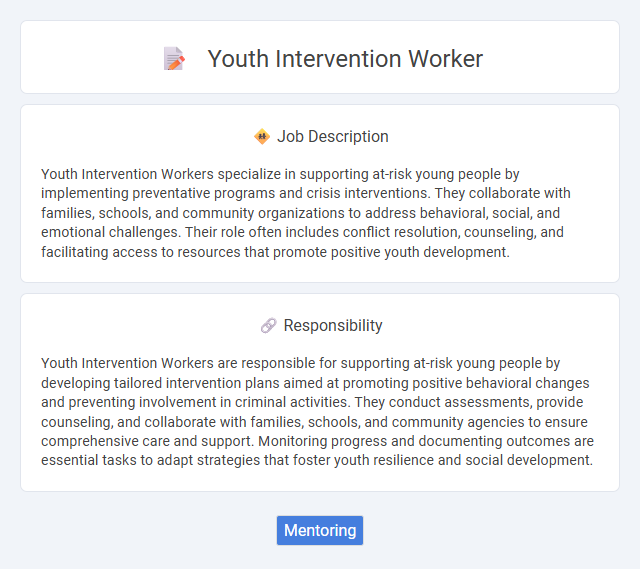
Youth Intervention Workers specialize in supporting at-risk young people by implementing preventative programs and crisis interventions. They collaborate with families, schools, and community organizations to address behavioral, social, and emotional challenges. Their role often includes conflict resolution, counseling, and facilitating access to resources that promote positive youth development.
Youth Intervention Workers likely encounter young individuals facing challenges such as behavioral issues, family conflicts, or substance abuse, requiring strong empathy and resilience. Those with patience, excellent communication skills, and a genuine desire to support at-risk youth may be well-suited for this role. Conversely, individuals uncomfortable with unpredictable situations or high-stress environments might find this job less compatible with their strengths.
Qualification
Youth Intervention Workers require a diploma or degree in social work, psychology, or a related human services field, coupled with experience in crisis intervention and counseling. Strong communication skills, cultural competence, and the ability to assess and manage risk factors are essential for effective youth support and rehabilitation. Certification in trauma-informed care and knowledge of community resources further enhance a candidate's qualifications for this role.
Responsibility
Youth Intervention Workers are responsible for supporting at-risk young people by developing tailored intervention plans aimed at promoting positive behavioral changes and preventing involvement in criminal activities. They conduct assessments, provide counseling, and collaborate with families, schools, and community agencies to ensure comprehensive care and support. Monitoring progress and documenting outcomes are essential tasks to adapt strategies that foster youth resilience and social development.
Benefit
A Youth Intervention Worker likely provides crucial support and guidance to at-risk young individuals, potentially reducing the risk of negative outcomes such as delinquency or substance abuse. This role may offer the opportunity to foster positive development and resilience in youth, contributing to healthier communities. Employment in this field probably comes with a sense of fulfillment and the chance to make measurable impacts on young lives.
Challenge
Youth Intervention Workers likely face significant challenges when addressing complex behavioral and emotional issues among young people. They probably encounter situations requiring quick decision-making and effective communication to de-escalate conflicts and provide support. Balancing the needs of youth with systemic constraints may present ongoing difficulties in delivering successful interventions.
Career Advancement
Youth Intervention Workers develop critical skills in counseling, conflict resolution, and community engagement, paving the way for advanced roles in social work and mental health services. Gaining experience in crisis management and case coordination enhances prospects for supervisory positions or specialized fields like juvenile justice and behavioral therapy. Certifications and continuing education further increase opportunities for leadership roles within nonprofit organizations and public agencies.
Key Terms
Mentoring
Youth Intervention Workers play a critical role in mentoring at-risk youth by offering guidance, emotional support, and positive role modeling to foster personal growth and resilience. They develop tailored mentoring programs that address individual needs, helping young people build essential life skills, improve decision-making, and avoid negative influences. Their work cultivates trust and empowerment, significantly reducing youth delinquency and promoting healthy social development.
 kuljobs.com
kuljobs.com